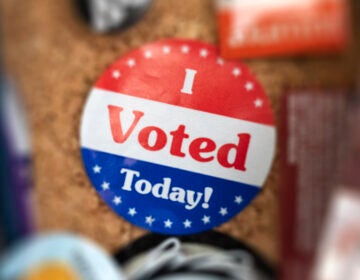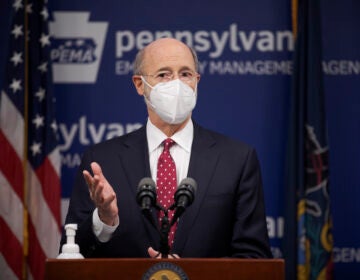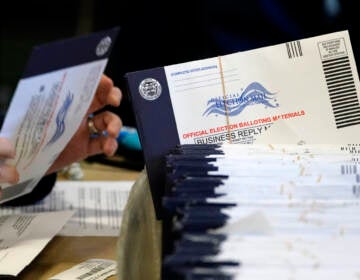Counties will again be unable to process mail ballots early during Pa.’s primary election
While a municipal primary typically sees low turnout, election officials said they can’t predict how many voters will take advantage of the state’s no-excuse mail voting law.

(Robert Frank for Spotlight PA)
This article is made possible through Votebeat, a nonpartisan reporting project covering local election integrity and voting access. This article is available for reprint under the terms of Votebeat’s republishing policy.
Local officials in Pennsylvania are facing another election without extra time to process mail ballots, likely leading to delayed results and putting increased pressure on counties reeling from the most expensive contest ever.
House Majority Leader Kerry Benninghoff (R., Centre) and Rep. Seth Grove (R., York) told the New Castle News last week they likely wouldn’t consider any election-related legislation until after the House State Government Committee completes its 14 election oversight meetings, the last of which is scheduled for May 5, less than two weeks before the May 18 primary.
The municipal primary — which includes races for local and appellate court judges, school board members, and township positions — typically has much lower turnout than a presidential race. But election officials said they can’t predict how many voters will take advantage of the state’s no-excuse mail voting law during an off-year election.
“It’s just not possible, even with a small election, to get everything counted in one day plus run another election,” said Marybeth Kuznik, Armstrong County’s election director.
Last year, county election officials repeatedly asked the Republican-controlled legislature to pass a bill giving them time before Election Day to begin processing, or pre-canvassing, mail ballots. A staggering 2.6 million people voted by mail in November, the first general election under a state law that allowed anyone to cast a ballot in that manner.
GOP leadership in the House last year tied pre-canvassing to banning drop boxes and relaxing restrictions on partisan poll watchers. Gov. Tom Wolf vowed to veto that measure, and the legislature failed to pass any changes.
As a result, election officials could only begin the process at 7 a.m. on Nov. 3, which led to false claims that Democrats were stealing the election from Trump as more mail votes for Joe Biden were counted after Election Day.
Local election officials faced a flood of complaints and blame over the delayed results, and more than 20 have left their positions since the General Assembly enacted no-excuse mail voting.
Months later, they’re still waiting for that extra time.
“I can’t say I’m expecting it,” Kuznik said. “I never expect anything with the legislature. I’ve learned long ago not to.”
A spokesperson for Grove said it would be premature to comment on legislation until the election oversight hearings are completed and “all voices are heard.”
Republican leaders in the House and Senate did not respond to questions from Spotlight PA and Votebeat about any election-related changes expected before May.
“I think we always believed that the [General Assembly] session schedule was not going to be conducive to getting any changes done in time for the May primary,” said Lisa Schaefer, executive director of the County Commissioners Association of Pennsylvania.
Schaefer is instead eyeing the lawmakers’ schedule in the second half of the year and hoping they consider legislation before they break for the summer in July. She said making any election-related changes after the legislature returns from its summer recess in September — six to eight weeks before the November election — would create a challenge for the election directors tasked with implementing and familiarizing themselves with those changes.
“Making changes in that time frame isn’t good for election directors, isn’t good for voters,” she said.
Schaefer said she isn’t expecting the May primary to be as problematic as the November election. County staff have now been through two elections under the new vote-by-mail law and should be more familiar with the process. The off-year primary also typically means fewer voters are casting ballots, which helps election directors manage the workload better.
And “there’s not a string of litigation going on that could potentially change the rules here and there,” Schaefer said, referring to state Supreme Court rulings that affected the way mail ballots were processed in the days and weeks leading up to the November election.
“We’re hopeful that it just won’t be as intense as it was in November,” said Indiana County commissioner Sherene Hess, who chairs the County Commissioners Association of Pennsylvania Election Reform Committee.
Those rule changes — which included last-minute guidance from the Department of State on how voters should be notified about mistakes on their mail ballot envelopes and what counties should do with late-arriving ballots — have been on full display at the House State Government Committee election hearings, with Republicans focusing on the ways counties inconsistently applied that guidance.
A spokesperson for Wolf said some GOP members are using the meetings “to manufacture bogus claims about voter fraud” so they can make it harder for people to vote.
Pennsylvania Republicans have filed or plan to file 14 bills that the Brennan Center for Justice said restrict or roll back access to voting, including bills that would repeal the state’s no-excuse mail voting.
“The simple fact is House Republicans do not need 14 hearings to tell us that Pennsylvanians want to make it easier to vote or that counties need pre-canvassing of mail ballots,” said Wolf spokesperson Lyndsay Kensinger.


Get daily updates from WHYY News!
WHYY is your source for fact-based, in-depth journalism and information. As a nonprofit organization, we rely on financial support from readers like you. Please give today.





